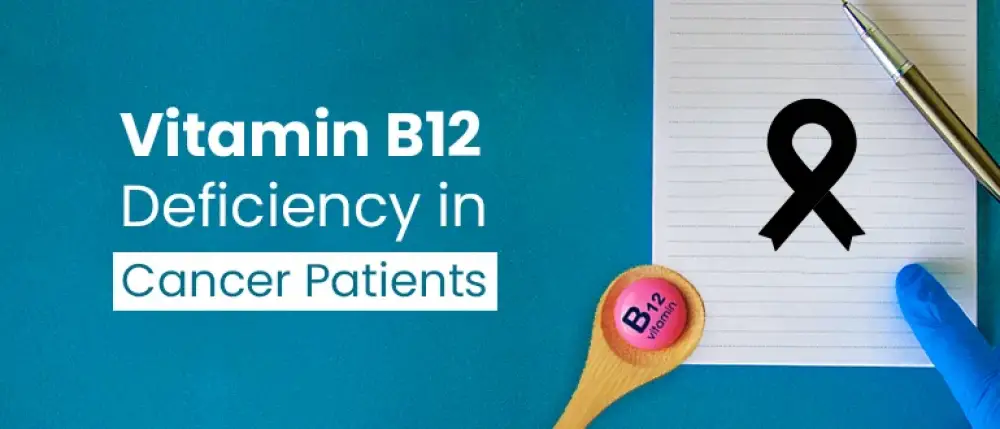Cancer survivors commonly face long-lasting side effects as a result of cancer treatment or the cancer itself. Treatments such as chemotherapy, surgeries, and radiation can result in nutritional deficiencies. Particularly, individuals with lung, stomach, colon, oesophageal, and pancreatic cancers are more prone to experiencing a deficiency in vitamin B12. This article will discuss different types of cancers causing vitamin B12 deficiency, associated symptoms, and available treatment options. Keep reading!
Common Cancers Causing Vitamin B12 Deficiency
The following are some common types of cancers that may result in vitamin B12 deficiency in patients.
Stomach/Gastric Cancer
Gastric cancer damages the cells that produce gastric juices in the stomach, responsible for the absorption of vitamin B12 in the small intestine. Often the treatment for gastric cancer involves removing a part of the stomach (gastrectomy) which further affects B12 absorption.
Pancreatic Cancer
Pancreatic cancer affects the digestive process because organs fail in the production of digestive enzymes due to pancreas dysfunction and thus impairs the absorption of essential nutrients. Chemotherapy makes it worse even further.
Blood Cancer
Blood cancer affects the bone marrow and the production of blood cells that are essential for the metabolism of vitamin B12. Hence vitamin B12 levels start depleting due to the body’s inability to manage B12 levels.
Oesophageal Cancer
Oesophageal cancer makes it difficult for a patient to swallow food which affects his nutritional intake. The treatment also impacts the oesophagus’ ability to transport food to the stomach. Hence, patients undergoing treatment for oesophageal cancer are at risk of developing B12 deficiency.
Vitamin B12 Deficiency Symptoms
Vitamin B12 deficiency causes neurological, physical and even psychological symptoms. Given below are some common vitamin b12 deficiency symptoms.
Fatigue
Vitamin B12 is essential for nerve function and keeping blood cells healthy. Hence, a deficiency in B12 causes fatigue due to reduced RBC production which affects oxygen delivery throughout the body. Vitamin B12 deficiency also causes anaemia.
Headaches
Headaches or migraine is one of the most common effects of b12 deficiency. In other words, the majority of people suffering from migraines have low levels of vitamin B12.
Pale Skin
Anaemia caused by vitamin B12 deficiency makes your skin look dull and pale due to the lack of healthy RBCs in the blood.
Mood Swings
Vitamin B12 deficiency causes cell death, DNA damage and oxidative stress which develop depression or changes in mood. People with low B12 levels can develop mood disorders or mental health issues.
Tingling in Hands and Feet
Vitamin B12 deficiency causes peripheral nerve damage which causes a tingling sensation in hands and feet which feels like pins.
Muscle Weakness and Numbness
Vitamin B12 deficiency causes many neurological symptoms such as muscle cramps and muscle weakness, slow reflexes and numbness in hands and feet.
Breathlessness
Anaemia due to a deficiency of vitamin B12, makes a person feel short of breath due to a lack of RBCs. Reduced RBCs also make the heart beat faster to ensure that there is sufficient oxygen supply throughout the body.
Pain in Mouth and Tongue
Vitamin B12 deficiency causes painful and swollen mouth and tongue which leads to bad taste and burning sensation in the mouth. This also happens due to a lack of RBCs and reduced oxygen supply to the tongue.
Cognitive Impairment
People suffering from vitamin B12 deficiency face problems in reasoning and thinking and are at high risk of dementia, Alzheimer's disease and Parkinson's disease. Cognitive impairment happens due to reduced oxygen supply to the brain.
Low Appetite and Weight Loss
Vitamin B12 deficiency also affects the digestive tract and causes reduced oxygen supply to the gut which makes a person feel sick with nausea and vomiting. Due to poor digestive health and constant nausea and vomiting, cancer patients with B12 deficiency lose their appetite, leading to weight loss.
Vitamin B12 Deficiency Treatment
Managing vitamin B12 deficiency in cancer patients requires different types of treatments depending on their symptoms and causes.
- B12 injections are one of the most effective ways to supplement B12 in severe cases of deficiency diseases where vitamin B12 is not absorbed in the body.
- Oral supplements are prescribed for less severe cases.
- Consuming vitamin B12 rich foods helps in managing B12 levels. Some good vitamin b12 sources include dairy, eggs, meat, and fortified cereals. Some examples of vitamin b12 foods are fish, cheese, yoghurt, apples, bananas, and blueberries.
Concluding lines
It is commonly seen that patients undergoing cancer treatment experience nutritional deficiencies. Hence, regular nutritional screening and providing them with essential nutrients along with cancer treatment is necessary until nutrition is restored. To make cancer treatment more effective and improve the quality of life after treatment, it is important to focus on managing nutritional deficiencies, such as vitamin B12 deficiency, through diet and supplementation.
Not to forget, the treatment expenses of cancer or related complications will be huge on your pocket if not planned properly. Thankfully, health insurance industry has evolved with plans that are designed to cater to the needs of a cancer patient where treatment expenses are covered up to a defined limit. If you are looking for critical illness coverage, Care Health Insurance offers comprehensive health insurance plans such as critical illness plan, cancer mediclaim and operation mediclaim. Get a health insurance plan from Care Health Insurance and get access to cashless facilities at more than 11500+ network hospitals and 21700+ healthcare service providers.
>> Also Read: Potassium Deficiency Symptoms
Disclaimers: The above information is for reference purposes only: Policy Assurance and Claims at the underwriter's discretion.
